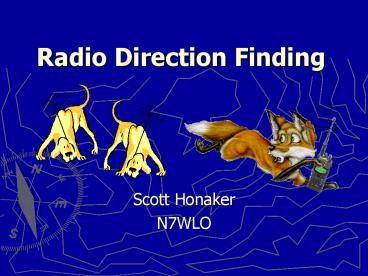Radio Direction Finding - PowerPoint PPT Presentation
1 / 12
Title:
Radio Direction Finding
Description:
http://home.att.net/~jleggio/projects/rdf/tape_bm.htm. Adjustable Attenuator. http://home.att.net/~jleggio/projects/rdf/p_atten.htm. Arrow Antenna ... – PowerPoint PPT presentation
Number of Views:2027
Avg rating:3.0/5.0
Title: Radio Direction Finding
1
Radio Direction Finding
- Scott Honaker
- N7WLO
2
Why do we need these skills?
- Locating Harmful Interference
- Jammers
- Stuck transmitters
- Local noise sources
- Search and Rescue
- ELT/EPIRBs
- FRS/ham radios
- Wildlife location
3
Triangulation
- Theory
- Take bearings from three points
- 90 of contacts will be inside intersecting
triangle - Dont neglect signal strength info
- Signal strength will depend on terrain
4
Wire Antenna
- Simple
- Signal strength only
- Directivity via body blocking
- Works better with stronger signal and well
shielded receiver - High skill level required
5
Beam/Yagi
- Very accurate bearings
- Requires cleanpattern and goodfront-to-back
ratio - Easily overloaded by strong signals
- Tune to null (sharper than gain)
- Can use front to help find weaker signals but
with reduced bearing accuracy
6
Loops
- More common on HF frequencies
- Very compact
- Tune to the null
- Bearings not very precise
- Has 180 degree ambiguity
7
Adcock Device Handi Finder
- Based on phase difference
- Antenna array MUST be symmetric
- Cant identify front/back without a third sense
antenna - Tune to no tone (signals in phase)
- Weak signals can be a problem
- Strong signals may cause too much multipath
8
Doppler DF DF Jr.
- Not real Doppler uses a pair of Adcock antennas
- Gives real-time bearings
- Only accurate to30 degrees
- Antenna size and spacing are frequency dependant
9
Foxhunting
- Containment Area
- Large (county) vs. small (city) or local (park)
- Drive times become significant
- Starting location
- Together vs. distributed
- Radios/antennas
- HTs vs. mobiles
- HTs offer portability but mobile meters are
often more accurate - Omni vs. beam
- Even 2m beams are unwieldy, omnis offer some info
while driving
10
RDF Techniques
- Mapping
- Time vs. accuracy
- Accurate bearing plotting is time consuming but
often valuable - Terrain
- Multipath issues particularly in urban areas
- Reflections can mislead and can be accentuated if
the target uses a directional antenna
11
RDF Techniques
- Going the last mile
- Attenuators for non-Adcock antennas
- Removing the antenna when within a couple blocks
- Body blocking
- Detuning decreases receiver sensitivity
- Tune a harmonic (2m 3rd harmonic on 70cm)
- Be aware of local multipath sources
12
Resources
- Homing In Site
- http//members.aol.com/homingin/
- Tape Measure Yagi
- http//home.att.net/jleggio/projects/rdf/tape_bm.
htm - Adjustable Attenuator
- http//home.att.net/jleggio/projects/rdf/p_atten.
htm - Arrow Antenna
- http//www.arrowantennas.com/
- Ultimate Automated Doppler DF System
- http//www.ahha-doppler.com/gpss/gpss.html































